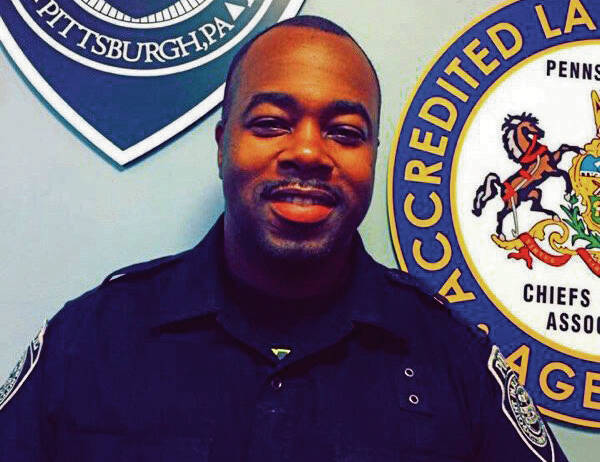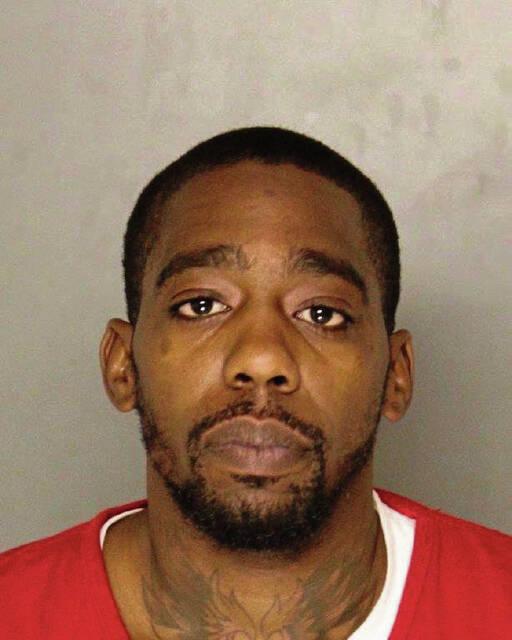Deliberations begin in trial of man charged in shooting death of off-duty Pittsburgh cop
The prosecution told the jurors they have more than enough evidence to reach a guilty verdict.
The three .45-caliber bullets that struck off-duty Pittsburgh police Officer Calvin Hall in the back match a .45-caliber handgun found in an alley near the crime scene behind the defendant’s house.
And DNA taken from the slide and grip of that handgun matches the defendant, Christian Bey.
“But we have more,” Deputy District Attorney Stephie Ramaley said during her closing argument on Wednesday.
There’s video footage showing a man in all black with a distinctive walk that matches the description given by two neutral eyewitnesses who said they saw the shooting.
And cell phone evidence that shows that Bey turned his cell phone off three minutes before the shooting, and cell phone tower evidence that showed the phone’s movements throughout the night.
“Physical evidence doesn’t lie,” Ramaley said.
She urged the jurors to find Bey, 34, guilty.
“It’s your turn to review the evidence. It’s your turn to follow common sense,” Ramaley said. “It’s your turn to find the defendant guilty of first-degree murder of Calvin Hall.”
Hall, 36, was shot following a block party on Monticello Street in Homewood about 1:30 a.m. on July 14, 2019.
He died three days later.
Police said that Hall was involved in an argument with the women across the street who hosted the block party and was shot as a result.
But Bey’s attorneys said that Hall was on the scene that night, waving a gun around and threatening people with it.
They denied their client was involved.
On Wednesday afternoon, just an hour after the jurors began their deliberations, they asked the court if they could review several pieces of video evidence admitted in the case, including the city camera showing the alleged suspect walking up Hermitage Street away from the crime scene, as well as body camera footage from the first officer on the scene.
The jurors must reach a verdict on criminal homicide and related gun charges. Although the defense wanted them to be given the option of voluntary manslaughter — in addition to first- and third-degree murder — Allegheny County Common Pleas Judge Kevin G. Sasinoski denied the request, saying that Bey’s attorneys had presented no evidence of justification for the shooting — or that it was in any kind of self-defense or defense of others.
This trial, which began on March 21, is a retrial after Bey’s first was abandoned on March 16 in the middle of the second day when a witness improperly referred to the defendant’s previous criminal history and incarceration.
The second trial was marked by frustration and discord among the attorneys and defendant, who repeatedly accused Sasinoski of being biased against him and his attorneys — although always outside the presence of the jurors.
Testimony was repeatedly delayed because of skirmishes between the parties, often for hours.
On one day last week, Bey asked Sasinoski to remove himself from the case, telling him he didn’t like many of his rulings.
The judge denied the request.
The attorneys, judge and defendant then had a closed-door session in chambers that lasted for several minutes and was punctuated by loud voices that could be heard in the courtroom.
The case was expected to get to closings on Tuesday but was delayed by four hours in the morning, after Bey claimed he did not know he had a right to call character witnesses in his defense.
Sasinoski gave him until 1:30 p.m. to bring any such witnesses to court.
However, when the trial resumed, Bey had no one to call.
The defense rested.
Defense attorney Carmen Robinson began her closing argument on Wednesday by apologizing for her personality.
“It can be polarizing, and enduring me can be a lot to ask,” she said.
She then turned to the evidence.
“I said at the beginning of this case that this was a rush to judgment,” Robinson said. “The police were loyal to a fault.”
The former Pittsburgh officer argued that the city police should not have investigated Hall’s death because he was a member of their department.
She accused them of tunnel vision and forming a narrative to match the evidence.
Robinson spoke repeatedly to the jurors about reasonable doubt and touched upon dozens of moments during the trial that she thought should add up to a not guilty verdict.
The defense panned the DNA evidence presented by the prosecution, telling the jurors that traditional DNA analysis would not work on the small sample size found on the gun used to kill Hall.
When the Allegheny County crime lab could not get results, Robinson said, the DA’s office turned to a company called TrueAllele, which uses probabilistic genotyping — a computer algorithm — to reach its conclusions. In this case, the prosecution said, the probability that the DNA found belonged to someone other than Bey was 1 in 7 nonillion.
“Don’t be fooled by that,” Robinson said. “They have no limits. They have no thresholds. You have to accept their method.”
She also questioned why the labs didn’t try to check the DNA against other members of the Bey family, who were at the party that night.
“You can just set that aside, and that’s reasonable doubt,” Robinson said.
The defense pointed out, too, that the prosecution failed to call Darnell Coates, a distant relative to Hall, who was with him that night and on scene when police arrived after the shooting.
“You’re not getting it all, and when your questions aren’t getting answered, and they’re reasonable questions, that’s reasonable doubt,” Robinson told the jury.
The defense attorney also asked them to pay close attention to the credibility of the witnesses.
But Ramaley said the same in her closing.
She called testimony put on by the defense — from Bey’s mother, sister and step-mother — “a well-rehearsed script.
When the women testified last week, they said that Bey was not at the scene when the shooting occurred.
“They lied to the police,” Ramaley said. “They lied to you.”
Part of the defense strategy in the case, she continued, was to go after Hall’s character — his blood alcohol concentration that night was 0.111%, and the defense witnesses claimed that Hall was waving a gun around and threatening people with it.
“They came in here and had to assassinate Calvin Hall’s character,” Ramaley said. “Do you really believe Calvin Hall is going to risk his career… with a bunch of drunk women?
“This case is not a rush to judgment. This case is not about bias. This case is about good police work.”
Paula Reed Ward is a TribLive reporter covering federal and Allegheny County courts. She joined the Trib in 2020 after spending nearly 17 years at the Pittsburgh Post-Gazette, where she was part of a Pulitzer Prize-winning team. She is the author of “Death by Cyanide.” She can be reached at pward@triblive.com.
Remove the ads from your TribLIVE reading experience but still support the journalists who create the content with TribLIVE Ad-Free.


